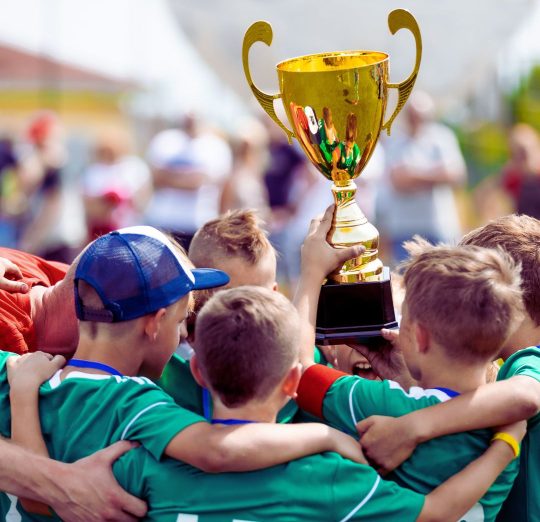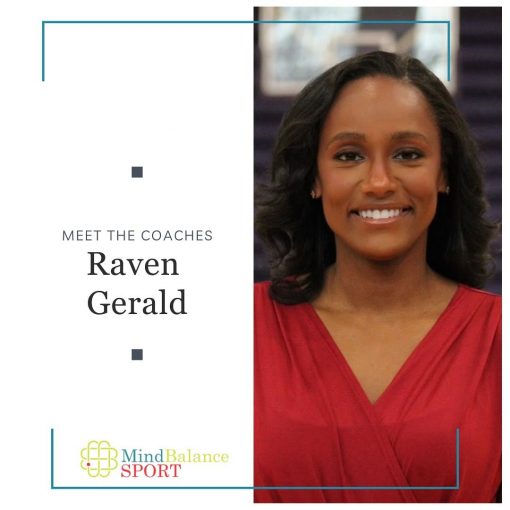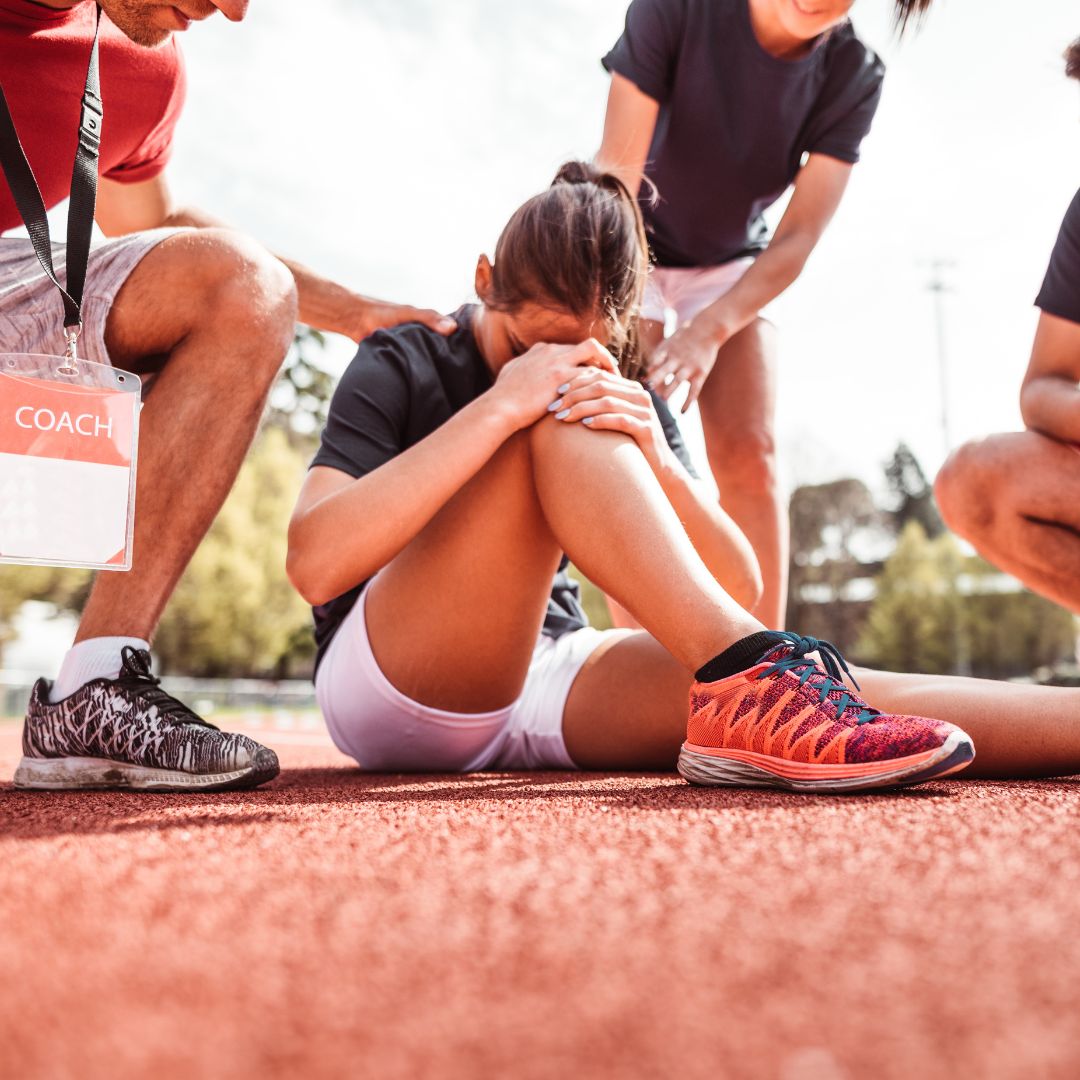Sports Psychologist in Gaithersburg, MD
You want to work on your mental game, but how do you train your brain?
At MindBalanceSPORT, We Train The Other Half Of The Athlete.
You want to work on your mental game, but how do you train your brain?
Mental training does not get much media attention, but at MindBalanceSPORT we know it is a game changer. The mental skills you will learn at MindBalanceSPORT are generalizable in the classroom, in sport and in life!
We know that mental skills can be successfully taught, even at an early age.

Our Services
Meet the Team





testimonials
Athlete Stories: Real Comebacks, Real Results

Emma, a high school basketball player, tore her ACL in the middle of her junior season. After surgery, she struggled with self-doubt and fear every time she stepped back on the court. Through sport psychology training, she learned visualization techniques and confidence-building exercises that helped her regain trust in her knee. When she returned for her senior season, she didn’t just play—she led her team to the playoffs.

Carlos, a soccer player, suffered a stress fracture in his foot and had to miss half of his season. Sitting out was mentally tougher than the pain itself. We worked on mental engagement strategies to keep him sharp—studying game film, setting small rehab goals, and using mental imagery to stay ready. When he was finally cleared, his confidence never wavered.

Jordan, a track athlete, strained her hamstring before a major competition. She feared losing speed and falling behind competitors. Instead of focusing on what she couldn’t do, we redirected her energy toward mental preparation, using self-talk and goal setting to keep her confidence strong. When she returned, she set a new personal record.
EXCELLENTTrustindex verifies that the original source of the review is Google. It was a great help to my 14-year-old competitive volleyball player daughter. Raven was great to understand and connect with her from start to end. We will continue with our sessions as needed.Trustindex verifies that the original source of the review is Google. Great results! I’ve loved working with Paula. Our sessions have greatly improved both the physical and mental aspects of my tennis game. I’m playing better and having more fun! Highly recommend!Trustindex verifies that the original source of the review is Google. Our family had a wonderful experience with Paula Castro. We needed some additional confidence in a particular area/sport and Paula helped get us there. We know who to turn to if we need help again. She’s been a Blessing. Thank you, Paula!Trustindex verifies that the original source of the review is Google. I highly recommend MindBalanceSPORT. Our son works with John Howard. John is very caring, positive, and effective at working with teenagers. John is an adept listener and created an individualized plan tailored to our son’s personality. After just a few sessions with John, we noticed a significant improvement in our son’s motivation and mental approach to sports and life in general. Our son looks forward to meeting with John and tells us that he benefits immensely from their connection.Trustindex verifies that the original source of the review is Google. Paula Castro is an outstanding professional on the field. She has helped my daughter improve her confidence, preparation, and thanks to these session she feels more prepared and motivated. Paula takes the time also to share (what she can) and align with us as parents to be on the same page. Strongly recommended!Trustindex verifies that the original source of the review is Google. MineBalanceSPORT has quickly become the area's expert in sports psychology. Their reputation is well deserved given their incredibly thoughtful, scientifically based approaches to treating performance-related conditions, and I have only heard glowing, positive feedback from those who have engaged in their program. I will also add that Drs. Jones and Chirby presented to us (our group comprises of 15+ doctors and masters level clinicans) about their program and impressed us all with their level of expertise and passion for this field. I give them my highest recommendation.Trustindex verifies that the original source of the review is Google. Dr. Jones was beyond helpful to me throughout our time together. If you are an athlete and you need advice or assistance this is the place to come to. She completely changed my outlook and mindset in a time when I needed her most. I look forward to staying in touch with her and am forever thankful for her expertise.Trustindex verifies that the original source of the review is Google. Paula has been a huge help with my daughter Morgan coming off her injury. It’s been 18 months since she’s played basketball and she’s thriving because I know Paula is guiding her the right direction. As a mother, I’m extremely gratefulTrustindex verifies that the original source of the review is Google. If you are looking for Amazing Psychologists who can help support you in your sports performance, you need to call MindBalanceSPORT! Dr. Chirby and her colleagues are a wealth of knowledge, they have so many helpful techniques for mind balance, and they have so much compassion for the communities that they serve! Highly recommend!!!
Recovery
While Everyone Has A Physical Ceiling, There Is No Mental Ceiling.
Explore Performance Psychology in Gaithersburg, MD to Stay Motivated and Stick to Your Exercise Program
Explore Performance Psychology in Gaithersburg, MD to Stay Motivated and Stick to Your Exercise Program
Struggling to maintain consistency in your exercise routine is a common challenge. With busy schedules, varying energy levels, or simply a lack of motivation, it can be difficult to stay committed. Sports psychologists specialize in understanding the mental and emotional barriers that prevent individuals from sticking to their fitness programs. They provide evidence-based strategies that can help anyone—from elite athletes to casual exercisers—maintain long-term motivation.
Why You May Be Struggling
Before diving into solutions, it’s important to identify the root causes of your inconsistency.
– Unrealistic expectations: Setting goals that are too ambitious can lead to frustration and burnout.
– Lack of variety: Repeating the same workout routines can cause boredom and stagnation.
– Time constraints: Balancing work, family, and personal time often leaves little room for exercise.
– Mental fatigue: Feeling overwhelmed by life’s demands can make workouts feel like an additional burden rather than a stress reliever.
Strategies From Sports Psychologists
- Specific: Clearly define what you want to achieve (e. g. , “run 5k in 30 minutes”).
- Measurable: Track your progress over time (e. g. , measure weekly distance).
- Achievable: Ensure your goals are realistic based on your current fitness level.
- Relevant: Link exercise goals with personal values or long-term benefits.
- Time-bound: Set deadlines for achieving short- and long-term milestones.
- Focus on Intrinsic Motivation
Instead of relying solely on external rewards like weight loss or appearance changes, sports psychologists encourage finding internal motivators such as: - Enjoying the activity itself.
- Feeling stronger or more energized after a session.
- Relieving stress through physical movement.
- Create Accountability Systems
Having someone hold you accountable increases adherence rates significantly: - Partner with friends for workouts.
- Join exercise communities or online groups.
- Use apps that track progress and send reminders.
- Visualize Success
Visualization is a proven mental technique used by athletes: - Picture yourself successfully completing your workout routine.
- Imagine how energized and accomplished you will feel afterward.
- Break It Down Into Micro-Habits:
Starting small prevents overwhelm—sports psychologists suggest habits such as:- Exercising for just 10 minutes daily until it becomes habitual.
- Adding movement into everyday tasks (e. g. , standing while working or taking stairs).
Tracking Progress With Tools Like Habit Trackers
Regularly monitoring progress allows you to stay engaged while identifying areas for improvement over time.
| Day | Activity Completed | Duration | Notes on Experience |
| Monday | Yoga | 20 mins | Felt calm post-session |
| Wednesday | Running | 15 mins | Harder than expected today |
| Friday | Bodyweight Workout | 25 mins | Great energy levels |
Overcoming Setbacks
Sports psychologists emphasize the importance of self-compassion when interruptions occur in your fitness journey: – View setbacks as learning opportunities rather than failures. – Reframe negative thoughts (“I skipped today”) into constructive ones (“I’ll pick up tomorrow”). – Avoid perfectionism by embracing flexibility in your schedule; if circumstances change, adjust rather than quit entirely.
By implementing these expert-backed strategies, staying motivated becomes less about discipline alone and more about building healthy mental frameworks around exercise routines.
How Sports Psychologists in Gaithersburg, MD Help Athletes Balance Exercise and Daily Life
Incorporating regular exercise into a busy lifestyle is often a challenge, even for dedicated athletes. Sports psychologists play a critical role in helping individuals establish routines and create sustainable habits. By addressing mental and emotional barriers, they provide tailored strategies that promote consistency and long-term adherence to training programs.
Breaking Barriers with Sport Performance Training in Gaithersburg, MD
Sports psychologists begin by assessing the obstacles that prevent individuals from maintaining a consistent exercise routine.
– Time constraints: Balancing work, family, and other obligations.
– Lack of motivation: Struggling to find purpose or enjoyment in exercise.
– Negative mindset: Feeling overwhelmed by past failures or unrealistic expectations.
– Fatigue and stress: Physical exhaustion or mental burnout from daily responsibilities.
Once these challenges are identified, sports psychologists work collaboratively with athletes to address them using targeted interventions.
Enhancing Performance with a Sports Mental Coach in Gaithersburg, MD
- Assign specific times for workouts based on existing commitments.
- Use tools like calendars, apps, or reminders to stay organized.
- Break larger fitness goals into manageable tasks (e. g. , 10-minute workouts).
- Celebrate small victories to maintain momentum over time.
- Pairing new habits (exercise) with established routines (e. g. , walking right after lunch).
- Design alternative plans in case unforeseen events disrupt the schedule.
Maximizing Performance with Sports Psychiatry in Gaithersburg, MD
Motivation can fluctuate over time, which is why sports psychologists emphasize intrinsic motivators—those linked to personal satisfaction—over external factors like rewards or recognition.
- Identifying “why” statements: Understanding deeper reasons for staying active (e. g. , improving health, reducing stress).
- Visualization exercises: Imagining successful completion of routines to reinforce positive associations with exercise.
- Encouraging accountability through workout partners or support groups.
- Seeking guidance from coaches or peers as encouragement during tough times.
How to Find a Sports Psychologist Near Me and Use Self-Monitoring Tools
Sports psychologists may also suggest incorporating self-monitoring practices to enhance consistency while managing progress effectively: | Tool/Method | Purpose | Example Applications | |———————-|—————————————-|————————————| | Fitness trackers | Measure daily activity levels | Apps/devices for tracking steps | | Journals | Reflect on emotions/achievements | Logs for workouts & dietary habits| | Progress photos | Visualize physical transformation | Side-by-side comparisons |
By combining these strategies with consistent effort, individuals gradually build an adaptable routine that integrates seamlessly into their everyday life.
Overall, sports psychologists focus not just on improving physical outcomes but also on fostering a positive relationship with exercise—one rooted in discipline balanced by enjoyment—a mindset critical for sustaining active lifestyles over the long term.
How Sports Counselling in Gaithersburg, MD Enhances Athletic Performance and Progress
Sports psychologists play a key role in helping athletes improve their performance by carefully monitoring progress and implementing strategies to enhance both physical and mental development. They work closely with athletes to ensure that their training programs are effective, sustainable, and aligned with their goals. Below, we explore how sports psychologists contribute to this process.
Tracking Performance Metrics
One of the main responsibilities of sports psychologists is to monitor athletic progress through both qualitative and quantitative measures.
- Self-Reflection Journaling:Encouraging athletes to document daily training sessions, emotions, and mental state.
- Goal Setting Reviews:Revisiting short-term and long-term goals regularly to ensure alignment with current capabilities.
- Statistical Analysis:Using data-driven methods to assess physical performance, such as speed, strength, endurance, and accuracy metrics.
By tracking these factors over time, sports psychologists can identify patterns and potential barriers that might affect an athlete’s progress.
Addressing Mental Barriers
Athletes often encounter psychological obstacles such as self-doubt or performance anxiety. These challenges can hinder their ability to improve consistently.
- Cognitive Behavioral Techniques (CBT):Teaching athletes how to reframe negative thoughts into positive affirmations.
- Mindfulness Training:Incorporating mindfulness practices like meditation or controlled breathing exercises for better focus.
- Stress Management Tools:Equipping athletes with strategies for managing stress in high-pressure situations.
These methods not only help athletes sustain motivation but also allow them to embrace setbacks as opportunities for growth.
Feedback Systems: A Collaborative Approach
Feedback is essential for improvement.
| Feedback Type | Purpose | Example |
| Immediate Feedback | Correct mistakes in real-time | Highlighting technique errors during drills |
| Reflective Feedback | Encourages post-session evaluation | Reviewing video footage after competitions |
| Peer-Based Feedback | Gains insights from teammates | Group discussions on team dynamics |
By creating open communication channels, sports psychologists ensure that feedback is constructive and actionable.
Enhancing Motivation Through Positive Reinforcement
Maintaining motivation is critical for consistent progress.
- Celebrating small milestones (e. g. , weekly performance improvements).
- Reward systems tailored to individual preferences (e. g. , rewarding effort rather than outcomes).
- Visual reminders of achievements (e. g. , charts or trophies).
These strategies keep athletes engaged while promoting a sense of accomplishment throughout their journey.
Continuous Adaptation
Progress is rarely linear in athletics.
- Physical conditions:Adjusting routines during injuries or recovery periods.
- Mental well-being:Modifying intensity based on the athlete’s psychological resilience.
- Goal evolution:Aligning plans with changing aspirations or competitive levels.
This dynamic approach ensures that athletes remain on track without risking burnout or stagnation.
By blending science-backed monitoring methods with individualized support systems, sports psychologists play an indispensable role in enhancing athletic performance over time.
Expert Tips From Sports Psychologists on Maintaining Realistic Fitness Goals and Preventing Overtraining
Maintaining realistic fitness goals and avoiding overtraining are essential for long-term success, whether you’re an elite athlete or someone pursuing general fitness. Sports psychologists play a vital role in helping individuals understand how to manage their mental and physical workload effectively. Here are some expert-backed tips to guide you in the process.
Setting Realistic Fitness Goals
One of the core principles of success is setting fitness goals that are both challenging and achievable. Unrealistic goals can lead to frustration, burnout, or even injury.
- Start With SMART Goals
- Instead of saying “I want to get fit,” specify “I aim to run 5 kilometers within 6 weeks.
- Ensure that it’s measurable—track distance or time improvements weekly.
- Long-term goals should be divided into manageable short-term steps to remain motivated.
- Celebrate small wins along the way to reinforce progress.
- Life circumstances and physical conditions change over time. Revisit your goals every few weeks to assess their feasibility.
Preventing Overtraining
Overtraining syndrome can have serious physical and psychological consequences. Sports psychologists often emphasize balance between effort and recovery to prevent this issue.
- Pay attention to warning signs like persistent fatigue, decreased performance, mood swings, or difficulty sleeping.
- Rest days are as important as training days for optimal results.
- Incorporate Variety in Your Routine
Cross-training helps reduce the risk of repetitive strain injuries while keeping workouts mentally engaging. - Use Scheduled Rest Periods
Structure your workout plan with recovery days or lighter activity weeks (e. g. , active recovery like walking or gentle yoga).
| Common Signs of Overtraining | Recommended Actions |
| Persistent muscle soreness | Incorporate more rest; consider a massage |
| Increased irritability | Practice mindfulness or stress management |
| Difficulty sleeping | Reduce intensity; ensure proper sleep hygiene |
| Plateau in performance | Reassess routine; add variety/periodization |
Balancing Ambition With Recovery
- Set Non-Fitness Life Goals Too
Engage in hobbies outside exercise for mental restoration. - Focus on Quality Over Quantity
A well-executed 30-minute workout often outweighs an unfocused hour-long session. - Encourage Positive Self-Talk
Replace thoughts like “I must train harder” with “Consistency will help me succeed.
By following these expert recommendations from sports psychologists, individuals can achieve sustainable progress while minimizing the physical and emotional risks associated with overtraining.
Understanding the Importance of Mental Strength and Focus Through the Guidance of Sports Psychologists
Mental strength and focus are critical components of success in sports, fitness, and even day-to-day life. Sports psychologists specialize in helping individuals develop these traits to enhance both their athletic performance and overall well-being. By using evidence-based strategies, they enable athletes to build resilience, maintain concentration, and perform at their peak under pressure.
What is Mental Strength?
Mental strength refers to an individual’s ability to manage stress, stay motivated, and adapt to challenging situations. In sports, it plays a vital role in overcoming obstacles such as injuries, setbacks, or poor performances.
- Resilience:The ability to bounce back from adversity.
- Self-confidence:Belief in one’s ability to achieve goals.
- Emotional control:Managing emotions effectively during high-stress situations.
- Focus:Concentrating on tasks without being distracted by external factors or negative thoughts.
Why Focus is Key for Athletes
Focus allows athletes to stay present rather than dwell on past mistakes or worry about future outcomes. A lapse in focus can lead to errors that might cost victories or progress toward personal milestones. Maintaining focus is especially important in high-pressure environments such as competitions or when facing tough opponents.
Techniques Used by Sports Psychologists
- Athletes are encouraged to imagine themselves succeeding at their tasks (e. g. , scoring a goal or completing a difficult routine). This helps build confidence and prepares their mind for real-life scenarios.
- Techniques like meditation and breathing exercises help athletes remain calm under pressure while improving concentration on the task at hand.
- Breaking down larger goals into smaller, achievable milestones helps maintain motivation and provides clearer direction for improvement.
- Replacing negative thoughts with constructive affirmations improves self-belief and reduces performance anxiety.
- Establishing consistent routines before games or events can create a sense of control and reduce nervousness.
Benefits of Developing Mental Strength and Focus
| Benefit | Impact on Performance |
| Improved stress management | Better decision-making during competition |
| Enhanced self-confidence | Greater willingness to take risks |
| Increased emotional resilience | Ability to recover quickly from setbacks |
| Sustained concentration | Reduced errors during matches or training sessions |
Real-Life Applications Beyond Sports
- Professionals can use mindfulness techniques for better productivity at work.
- Students may benefit from visualization exercises during exams.
- Anyone striving toward long-term goals can apply principles of resilience and positive self-talk.
By fostering mental strength and honing focus through structured guidance from sports psychologists, individuals gain tools that empower them not just in sports but across all aspects of life.
How Sports Psychologists Design Personalized Strategies for Long-Term Athletic Success
Sports psychologists play an essential role in helping athletes achieve sustained success by tailoring strategies to meet their unique needs. These personalized approaches often encompass mental, physical, and emotional aspects to ensure long-term athletic growth and consistency. Below are key ways sports psychologists create individualized plans to maximize performance over time.
- Current skillset: Strengths, weaknesses, opportunities for growth.
- Psychological profile: Stress management skills, confidence levels, focus, and motivation.
- Lifestyle factors: Sleep patterns, nutrition habits, recovery routines, and external responsibilities (e. g. , work or school).
This assessment provides insights into barriers that may hinder progress or contribute to burnout.
Setting achievable goals is crucial for athletes aiming for long-term success.
| Goal Type | Example | Purpose |
| Short-Term | Improve reaction time by 10% | Keeps motivation high through small wins. |
| Long-Term | Qualify for national competition | Provides direction over several years. |
To prevent overwhelm or unrealistic expectations, goals are broken into manageable steps that foster steady progress.
Mental resilience is critical in navigating the ups and downs of an athletic career.
- Visualization practices: Mentally rehearsing successful performances under competitive conditions.
- Mindfulness training: Staying present during key moments to reduce overthinking or performance anxiety.
- Reframing setbacks as opportunities: Rebuilding confidence after losses or injuries.
Each technique is customized depending on how the athlete responds best under pressure.
A one-size-fits-all approach does not work in athletics due to differences in physiology, experience levels, and personal preferences.
- Incorporating variety (strength training + skill drills) to maintain interest.
- Balancing intensity with recovery periods tailored to each athlete’s capacity.
- Adjustments based on real-time feedback from the athlete about energy levels or stressors.
- Performance Metrics– Tracking competition results, personal records, or benchmarks relevant to the sport.
- Psychological State– Using journals or mood trackers to identify patterns in focus or motivation levels.
- Feedback Sessions– Engaging athletes in open conversations regarding what’s working versus what feels overwhelming.
This iterative process allows athletes to pivot strategies as needed rather than becoming stagnant.
By combining scientific principles with a deep understanding of an athlete’s individuality, sports psychologists provide a roadmap for enduring success both on and off the field—transforming potential into sustained achievement over time.








